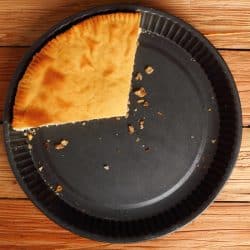Figuring out whether the food in your kitchen has gone bad or not can be confusing. Do you want to use your bananas for baking/cooking with but don't know if it's safe because they are black? Well, we've done plenty of research into this question and have all of the answers here for you. Let's dive right in!
Yes, you should be fine to eat and cook with black bananas. Typically, a black banana works best for baking, specifically banana bread recipes, as they have developed more sugar during the ripening process. Furthermore, darker bananas will become mushier as time goes on, making them easier to work with.
As we begin, we will cover all things bananas and discuss what to do with your super ripe ones. Whether you forgot to eat your fresh fruit or need ideas for future leftovers, we're here to answer all of your queries. With that said, let's dive right into this topic!

What Does It Mean When A Banana Is Black?
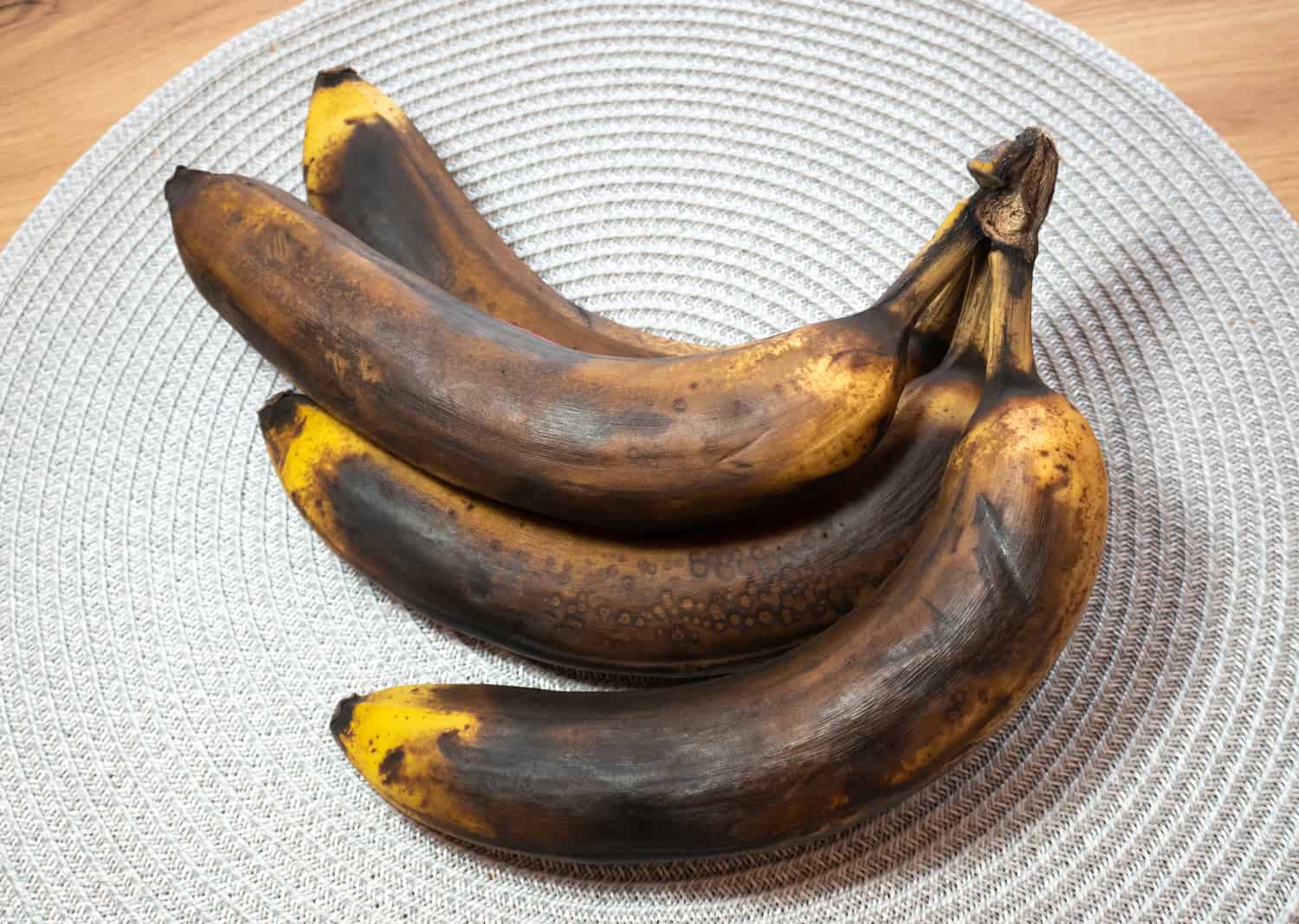
For those with a black banana wondering what went wrong, this is completely normal. Usually, as a banana ripens, you will notice its outer skin change color.
This happens because the polyphenol oxidase (an enzyme that causes the fruit to ripen) reacts with the air around it. We refer to this as ripening.
Most bananas will develop brown spots, turn almost entirely brown, and finally turn black. When a banana is super dark, it tends to be softer and sweeter, so it's not necessarily a bad thing to let happen.
Is It Okay To Eat Black Bananas?
Yes! It is 100% safe to consume a black banana. Generally, eating darker bananas comes down to texture. If you don't mind a super mushy meal, this won't affect you at all.
However, most bakers recommend using your ripened bananas for banana bread, as they are easier to work with. Furthermore, black bananas will be super sweet, which is perfect for a baked good.
You could also try turning your black bananas into a healthy smoothie, so there are plenty of ways to enjoy them.
Can Black Bananas Make You Sick?
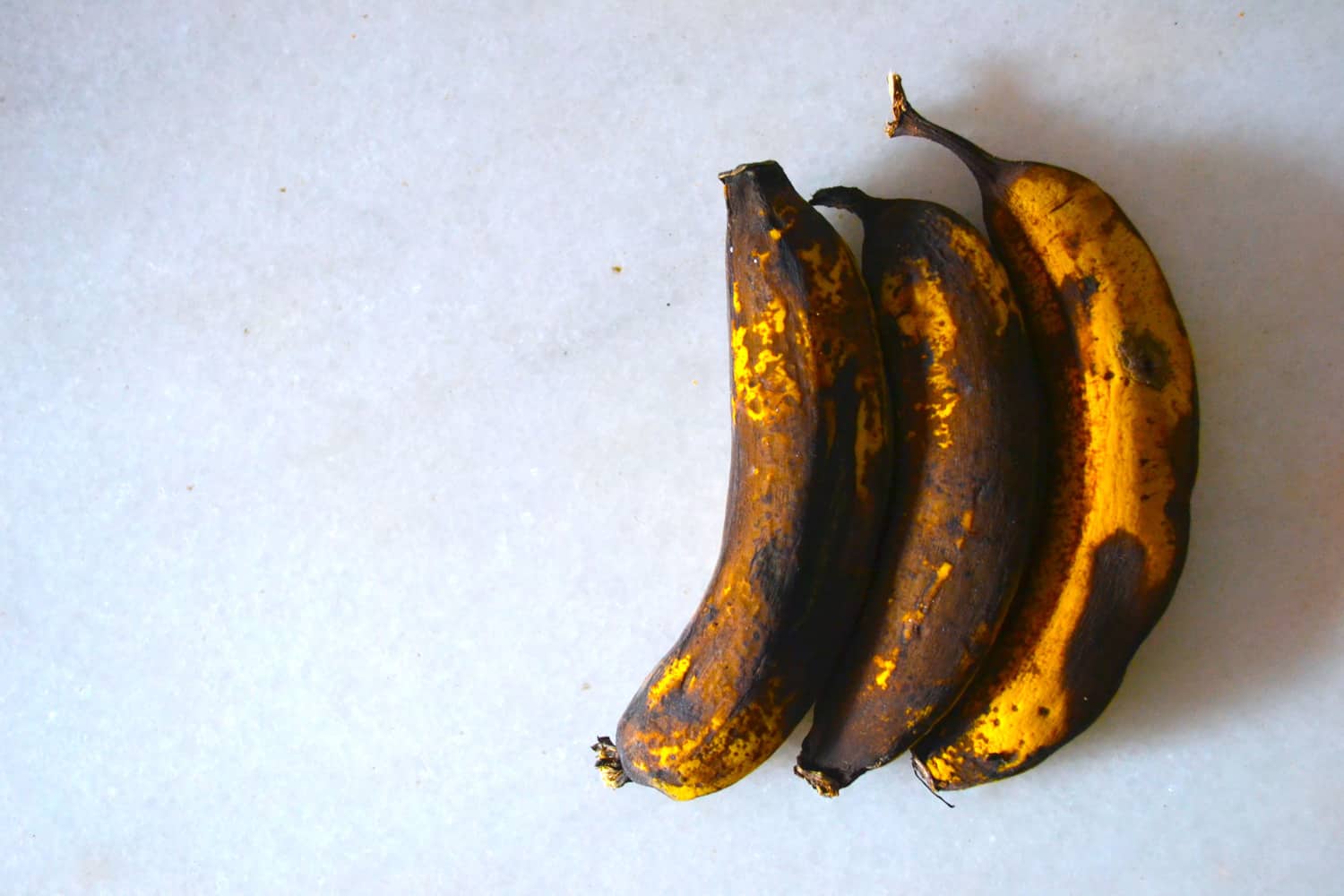
Although an ultra-ripe banana is safe to eat, a rotten piece of fruit is not. Most times, black bananas will be the last edible stage of your fruit, so this can mean a shorter time to consume it.
LiveStrong recommends inspecting black bananas before eating or baking them. You can do this by checking for mold or any signs of bugs/bacteria.
Typically, a rotten banana will have a powerful scent. This will be sour. Your banana might even start to decay in front of you, which means it's time for the garbage or compost pile.
What Happens If I Eat A Black Banana?
Eating a black banana won't have any adverse effects on your health. However, if the black banana you eat is rotten, you could be ingesting mold.
Not only is this dangerous, but it could even lead to hospitalization. According to Healthline, consuming mold can lead to acute toxicity.
Symptoms typically include:
- Vomiting
- Diarrhea
- Migraine
- Liver disease
- Shortness of breath
- Elevated temperature
- Hospitalization
Think of these as mainly gastrointestinal side effects, so if you recently ate an older banana and feel nauseous/sick to your stomach, you may want to get to a doctor.
How Long Are Bananas Good For?
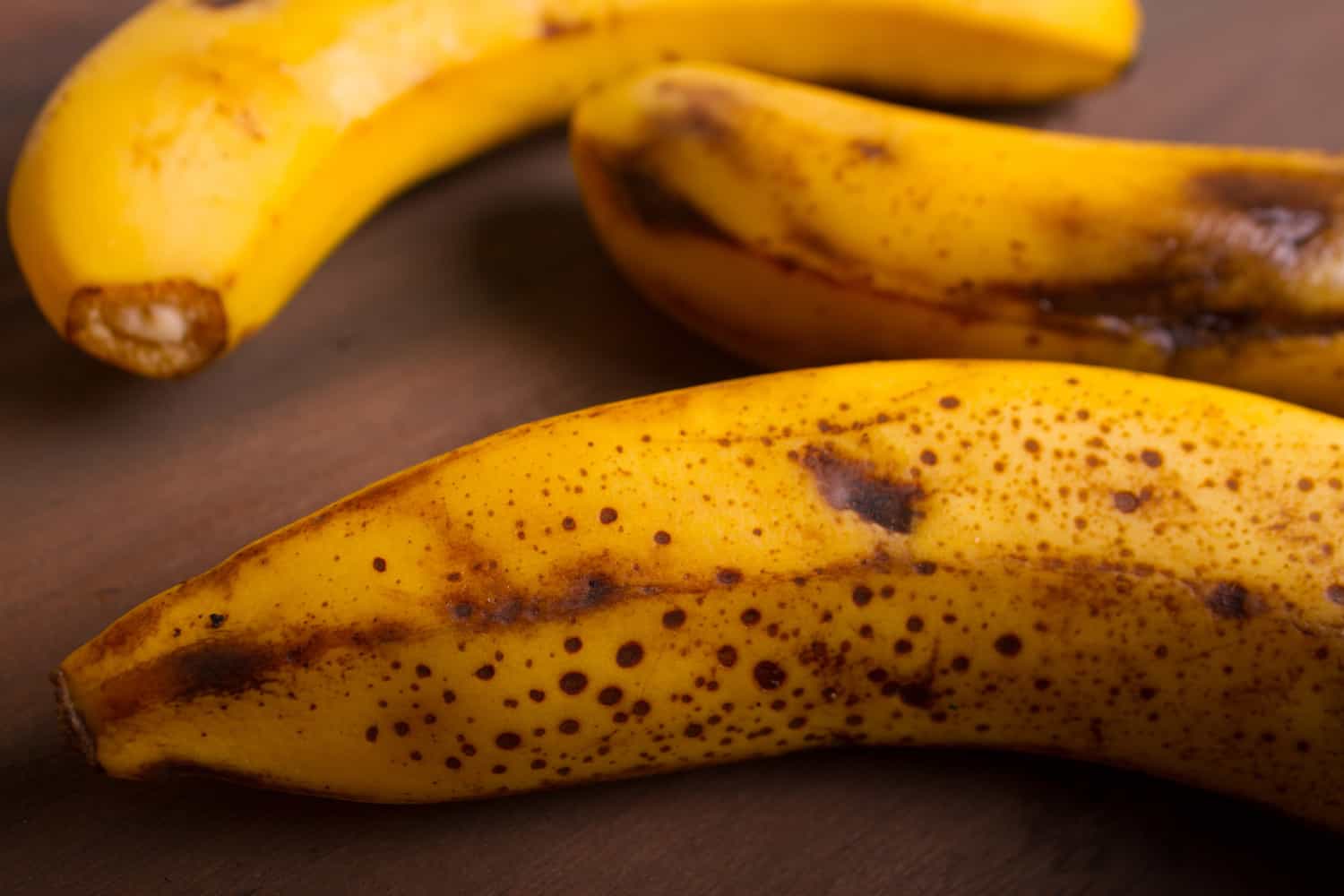
You can expect to have a banana stay good for about a week. Of course, this timeline can depend on how and where you store your fruit, so everyone is different.
It's usually best to keep ripe bananas in the refrigerator until you use them, as this can extend their shelf life and keep mold from forming on them.
Additionally, you should be fine to leave your bananas out on the counter while they ripen, although this could attract flies/other critters to your kitchen.
Can Bananas Last 2 Weeks?
For anyone wanting to test the limits of their bananas, two weeks isn't likely. As we said, bananas, if stored correctly, will last about a week before they start to rot.
You can try putting your fruit into the fridge to extend this lifespan by a few days, although two weeks is pushing it. Even in colder temperatures, bananas will deteriorate, ultimately exposing them to bacteria.
This goes for most fruits, so try to eat your bananas within seven days.
Should Bananas Go In The Fridge?
Although the refrigerator can help slow down a banana's ripening process, you don't always need to do this. Generally, placing a banana into a fridge will slow, if not stop, its ripening altogether, which can affect how good it tastes.
We recommend keeping bananas out on the counter or in a pantry until they are ripe and then putting them into your refrigerator. Doing this will give them time to sweeten and age without negatively affecting their flavor.
However, if it's been a few days at room temperature and you want to keep your bananas until next week, you can certainly refrigerate them.
Can You Freeze Black Bananas?
If you aren't ready to eat your banana, but it's turned black, the freezer may be your only option. Considering that the fridge won't preserve your fruit, placing it into the freezer is a great idea.
That said, you want to make sure your bananas aren't already rotten. Inspect them and keep a close eye out for mold or anything unusual on their outer skin.
As we mentioned, rotten bananas will also smell very sour, so that's good to check before wrapping one and freezing it.
Can I Use Black Bananas For Banana Pie?
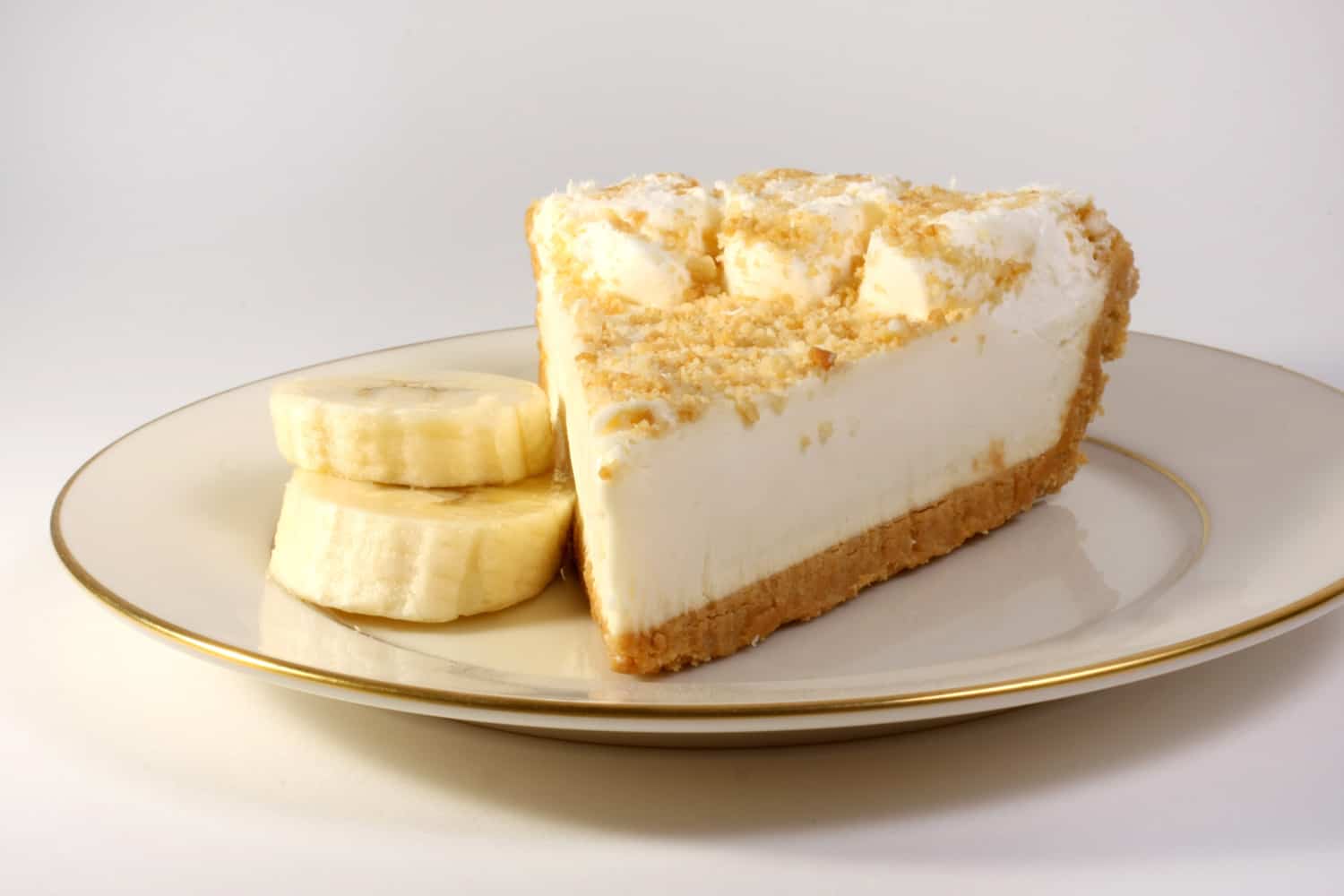
Although black bananas are perfect for banana bread, using them for a pie might not be the best idea. Considering a banana cream pie tends to need fresh, yellow bananas, using black, ultra-ripe options isn't the best option.
When it comes to pie, you want to consider its shelf life. Banana cream pie typically lasts a few days before losing quality/flavor, figuring you use fresh bananas.
Imagine if you use black bananas for your pie: it's completely mushy the next day and doesn't taste very good. You've now made a pie that has to be eaten the day of, which isn't always possible.
So, instead, we recommend yellow bananas for pie and black for bread.
Can Bananas Be Too Ripe For Baking?
Yes, a banana can be too ripe for certain types of baking. For example, black bananas will work nicely for baking banana bread but not as great for banana pie.
This comes down to the consistency of the dessert you plan to make. Typically, super-ripe fruit is perfect for bread recipes, while pies require firmer, less ripe options.
According to Living On Cookies, there's no such thing as too-ripe bananas for banana bread (unless they are moldy), so that's good to know.
Why do Bananas Go Bad So Quickly?
Bananas tend to go bad so quickly because they produce too much of their own ethylene. This can be problematic, as ethylene is what is to blame for the blackening of your fruit.
High amounts of ethylene will cause the yellow pigments in a banana to decay, ultimately turning your piece of fruit brown/black. This process is called enzymatic browning, or as we refer to it, "ripening."
Again, even black, a banana is still edible, so don't think you need to throw away all of the super-ripe fruit inside your kitchen.
What Is The Best Way To Keep Bananas Fresh?
If you want to have your bananas last longer, there are plenty of things to try. A few easy ways to keep bananas fresh include:
- Keep them cool and protected from light/sun exposure.
- Store bananas at room temperature until they are ripe.
- Move your fruit into the fridge once they have ripened.
- Sprinkle lemon juice on your banana to extend its lifespan.
- Tightly wrap bananas in plastic before refrigeration/freezing.
Furthermore, try to eat your bananas within seven days or use them for a banana bread recipe to avoid wasting food. You can also throw your unused fruit into a compost pile if you want to try a green alternative to the landfill, so there are many ways to tackle this.
Does Separating Bananas Slow The Ripening Process?
Surprisingly, separating bananas can help slow their ripening process. Generally, wrapping your bananas separately and keeping them inside the fridge will help extend their shelf life.
This is because bananas create and release ethylene gas, which is what speeds up their blacking process. So if they aren't able to be near each other, that means less gas is coming in contact with them.
To Wrap It Up
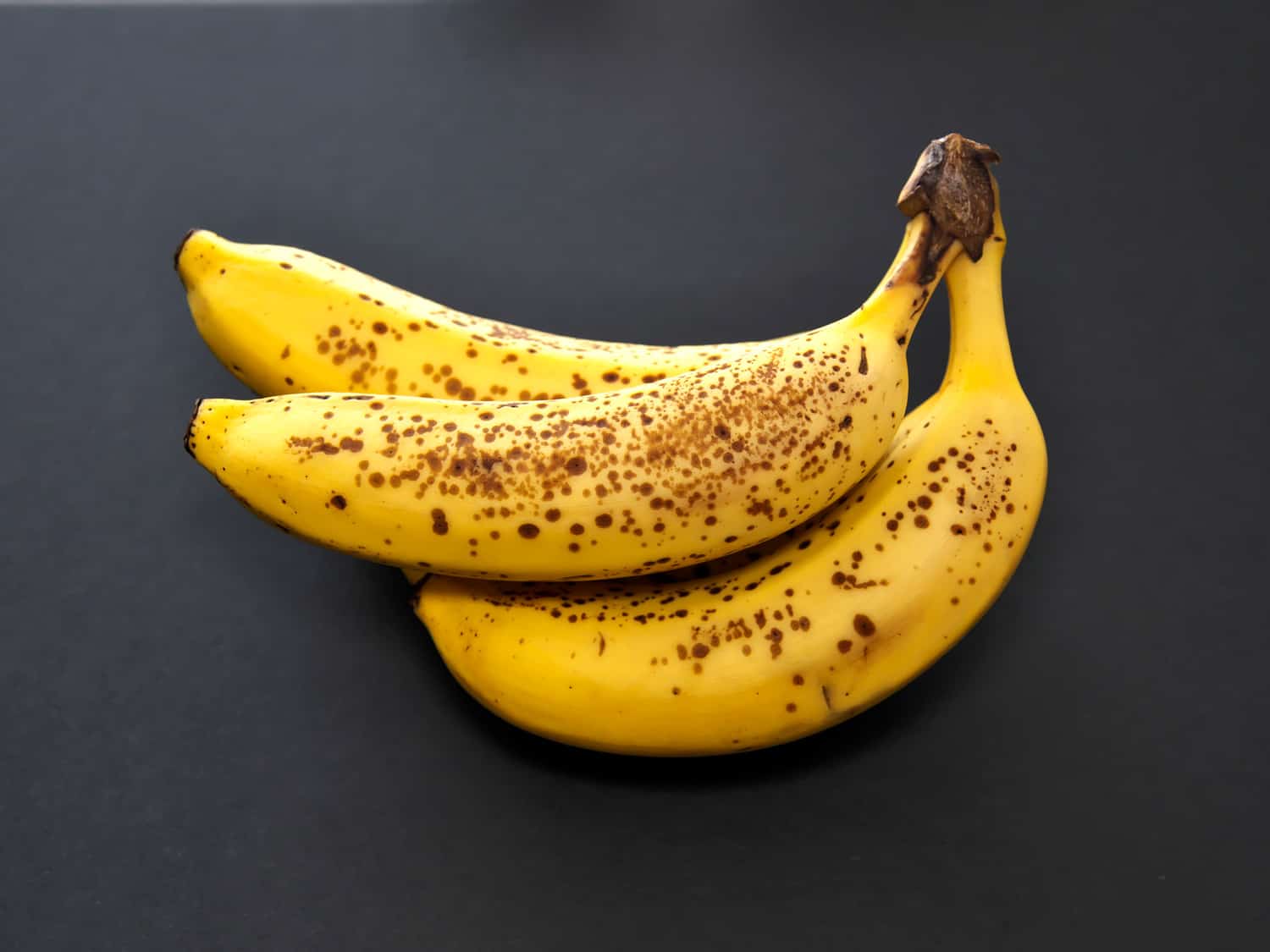
Whether you love waiting for your fruit to ripen or can't stand mushy bananas, it's good to know whether black bananas are safe to eat. You can eat and bake with black bananas from what we found, although you'll first want to check them for mold.
Additionally, black bananas work great for banana bread, which could be an excuse to make a yummy dessert. When it comes to other desserts, like pie, we don't recommend using overly ripe bananas, as this could affect the consistency/shelf-life of your sweet treat.
Regardless, make sure to store your bananas at room temperature until they are ripe, and then move them into the fridge or freezer.
Made it to the end? Check out these helpful related kitchen posts below!
Does Food Dry Out When Left Uncovered In The Fridge?
Do Apples Last Longer In The Fridge Or On The Counter?
How To Store Nectarines And Peaches To Keep Them From Spoiling

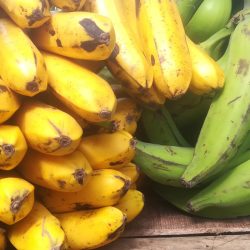

![A woman making a delicious pie in her kitchen, How To Put Dough In A Pie Pan [A Complete Guide]](https://kitchenseer.com/wp-content/uploads/2021/08/A-woman-making-a-delicious-pie-in-her-kitchen-250x250.jpg)


